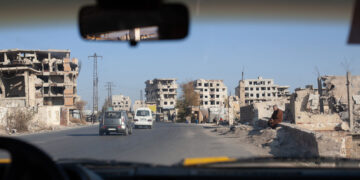Joost Hiltermann is the Program Director for the Middle East and North Africa at the International Crisis Group.
عربي
There has been a noticeable relaxation of tensions in the Middle East over the past year. Various antagonistic actors have resumed communications—though one hesitates to elevate them to the notion of "dialogue" just yet—suggesting that the region's leaders are recalibrating after the heady, unpredictable years of Donald's Trump presidency in the United States. One of the most dynamic, versatile and forceful actors is the United Arab Emirates, which has been projecting itself militarily in various theaters for several years, but now says it is shifting to a greater emphasis on diplomacy.
The UAE is sometimes referred to, admiringly or disparagingly, as "little Sparta"—a power that punches above its weight in a treacherous neighborhood. (The nickname apparently came from Gen. James Mattis, Trump's first secretary of defense.) Just over its border lies Saudi Arabia, a difficult ally at the best of times. Across the waters of the Gulf, whose name—Persian or Arabian—is disputed between the countries along its shores, sits Iran.
While Emirati leaders also see a threat in the ideology of the Muslim Brotherhood, an Islamist movement with widespread support throughout the Middle East that participates in parliamentary politics, at least where it is permitted to, they are troubled most of all by what they see as Iran's ambition to dominate the region. Along with Saudi Arabia and others, the UAE has long relied on the U.S. military for protection against this enemy across the Gulf. The problem, from the Emirati perspective, is that it has seen the U.S. under successive presidents if not retreating from the region, at least becoming a less reliable partner than it once was—from George W. Bush to Barack Obama, to Trump and now up to Joe Biden.
And so the UAE decided to go a step further and attempt to become what one might call "the little Sparta that could"—to set out on a path less dependent exclusively on U.S. military protection, more self-reliant in security terms generally, more diversified in its external relations, more entrepreneurial, and more assertive in defending and advancing its own strategic interests. This new strategy has been dictated by circumstance, and the UAE has pursued it steadily, notwithstanding setbacks and reversals, most glaringly in Yemen and Libya, where its military interventions and support for local partners have run aground.
A growing perception of no longer being able to fully rely on U.S. protection has led the Emirates to perform a delicate balancing act vis-à-vis its enemies and partners over the past few years.
- Joost Hiltermann
This does not mean that the UAE's relationship with both Saudi Arabia and the United States has lessened, even if some of the actions it has taken and the hints it has dropped suggest an attempt at needling Washington to fully recommit to their strategic partnership rather than let ties further loosen. The UAE has developed robust trade relations with China, for example, and its leaders have recently visited both Moscow and Damascus. There have also been unconfirmed reports that China is establishing some type of base or military presence on Emirati soil. Gulf Arab leaders realize that while China may be looming and must be engaged, nothing can really replace the U.S. military umbrella in the Gulf for now. But, they still ask themselves, will it unfold in time, or at all, if and when they face an acute threat?
This growing perception of no longer being able to fully rely on U.S. protection has led the Emirates to perform a delicate balancing act vis-à-vis its enemies and partners over the past few years. The UAE backed Trump's "maximum pressure" campaign against Iran after Trump withdrew the U.S. from the Iran nuclear deal in 2018, at the Emirates' urging. And it formalized its not-so-quiet security relationship with Israel through full diplomatic normalization last year. But when the Emirati government realized that U.S. strategy was not working or even backfiring under Trump, it then made conciliatory gestures toward Iran during Trump's final year in office, especially of the humanitarian kind following the outbreak of the coronavirus pandemic. It also kept open channels of communications about issues of strategic concern—highlighted by a series of high-level visits by Emirati security officials to Tehran starting in 2019—which officials in Abu Dhabi play down as mere "technical meetings."
The UAE's overtures toward Israel were particularly sensitive. According to my recent conversations in Abu Dhabi, Iranian leaders reportedly told a visiting Emirati delegation in Tehran that it could tolerate the UAE seeking to improve commercial relations with Israel, but that any further boosting of the two countries' security relationship would be intolerable, especially if it gave Israel access to the Gulf. Iranian intimations of red lines resonate in the Gulf Arab states, where officials saw the ease with which a swarm of drone strikes, claimed by the Houthis in Yemen but suspected of having originated in Iran, knocked out half of Saudi Arabia's oil production in September 2019.
From the Emirati perspective, however, its budding relationship with Israel is mainly an insurance policy, one fashioned less against warding off a direct Iranian attack on the UAE than against the UAE becoming collateral in any future war between Israel—with or without U.S. backing—and Iran. My recent conversations with officials in Abu Dhabi suggest that the UAE wants to be in the room if and when the U.S. and Israel start discussing the possible use of force against Iran, so it can serve as a moderating voice and maintain that their shared objective should be to contain Iran, not to try to subdue it.
The UAE has told U.S. officials visiting the region that it supports efforts to revive the Iran nuclear deal, according to recent conversations with Emirati officials.
- Joost Hiltermann
The UAE is also hedging its bets with respect to the Iran nuclear deal, formally known as the Joint Comprehensive Plan for Action, or JCPOA. When the U.S. and Iran launched nuclear negotiations during the respective Obama and Rouhani administrations, the UAE, like Saudi Arabia, expressed its discontent. It deemed Iran's regional power projection—its supposed hegemonic ambitions in the Gulf, manifested in its support for non-state armed groups—and its ballistic missiles program of much greater importance than putting a lid on its nuclear program.
Today, by contrast, the UAE has told U.S. officials visiting the region that it supports efforts to revive the Iran nuclear deal, according to the recent conversations I had with Emirati officials. This may indicate that the Emirati government has acquiesced to this eventuality, but perhaps it is quietly predicting instead that these efforts will fail. (In comments last April, the UAE's ambassador to Washington, Yousef al-Otaiba, said that the Biden administration should use its leverage to get a "better" nuclear deal and that it was "in the driver's seat to get to a point to where we can address what I believe were shortcomings in JCPOA.") Either way, any Emirati support for renewed nuclear talks should provide comfort to those in Washington and Tehran who want to salvage the deal, but it won't have much impact. In discussions with U.S. officials, the Emirati government has continuously stressed its own primary concern and strategic priority: the need to engage Iran on what the UAE sees as its power projection and apparent hegemonic ambitions in the region.
In pursuing its own course, the UAE is showing itself to be the region's most ambitious and even pioneering power after Israel. It's often not loved as a result. Palestinians feel betrayed by its siding with Israel in last year's "Abraham Accords," and they can still count on popular support among large segments of the Arab world—including in the UAE itself—that reject their leaders' normalization deals. Nor has the UAE gained anything from its involvement in the long and brutal civil wars in Libya and Yemen, where military offensives it has backed by its local partners have sown widespread destruction. The UAE's other neighbors and fellow members in the Gulf Cooperation Council, Qatar and Oman, are wary of its ambitions, each for its own reasons, rendering the GCC all but useless as a forum for regional cooperation.
The UAE's leadership does not seek to be loved, of course, but it should be concerned that—Israel, Saudi Arabia and the U.S. aside—it has generated so much animus across the region. It is now embarking on what its officials described to me as its "zero-enemies-in-the-neighborhood" policy. They must hope that these efforts outdo those of Turkey, which aspired to the same barely a decade ago and obtained the opposite result. This tactical adjustment requires less muscle-flexing and more diplomacy. It would include talking to regional heavyweights Turkey and Iran about cultural issues first, as building blocks, while for now ignoring the "herd of elephants" in the room—"hard" security issues, as one Emirati official put it. It's anyone's guess whether "little Sparta" can pull it off.





































